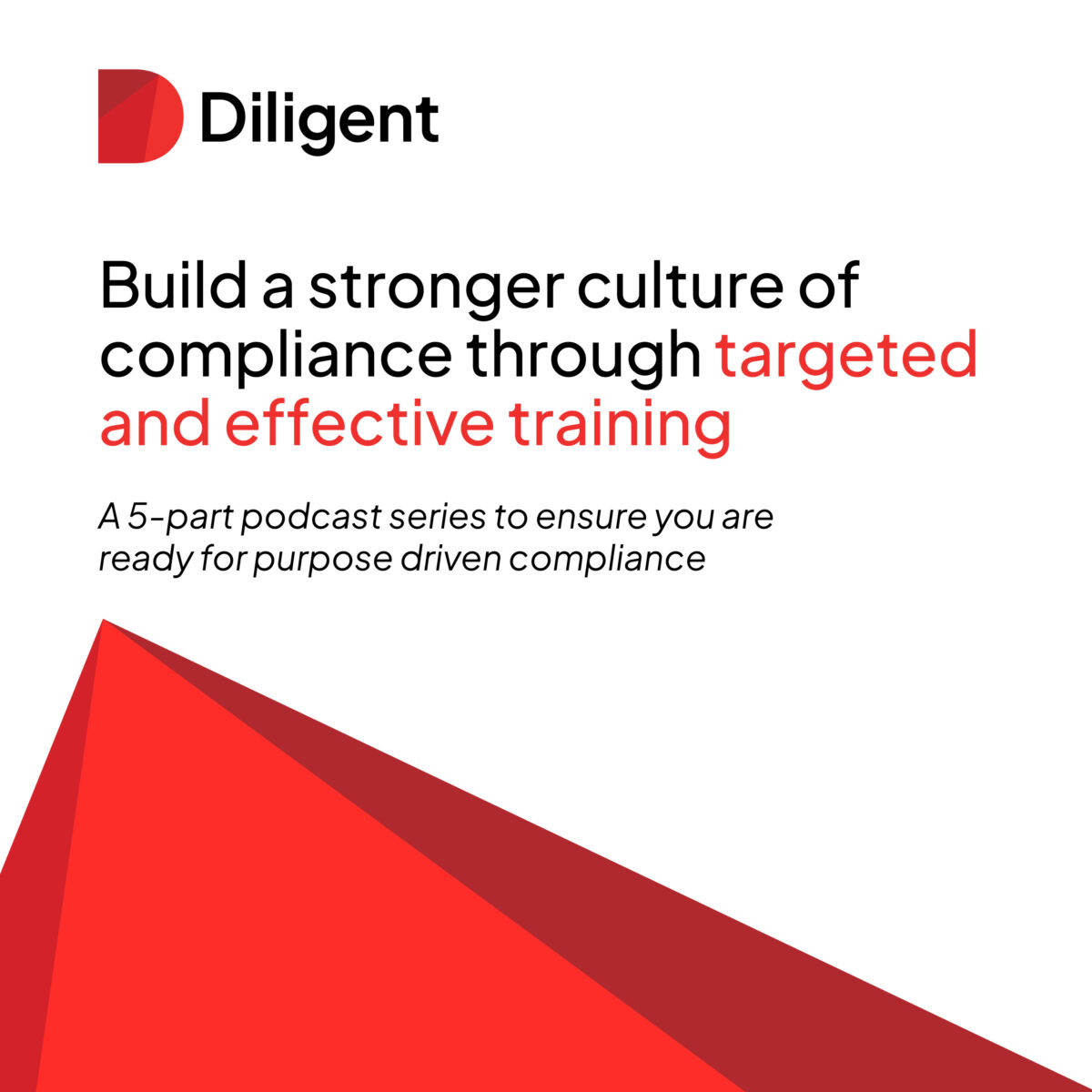Welcome to a special 5 part blog post series on building a stronger culture of compliance through targeted and effective training, sponsored by Diligent. Over this series I will visit with Kunal Agrawal, Director of Customer Success at Diligent; Kevin McCoy, Customer Success Manager at Diligent; Jessica Czeczuga, a Principal Instructional Designer; Andrew Rincon, Global Accounts Management Advisor at Diligent; and David Greenberg, former CEO and Special Advisor at LRN and Director at International Seaways. Over this series, we will consider the importance of ongoing communications, the value of targeted training, training third-parties, and the role of the Board of Directors. In this Part 2, we consider the the value of targeted training with Kevin McCoy.
Navigating the complex world of international compliance requires a thorough understanding of regional regulations and a commitment to keeping your workforce informed and prepared. As a corporate compliance and ethics professional, it falls upon you to create robust training programs that cater to the specific needs of your organization across various regions. Improved engagement and effectiveness of compliance training have significant implications on both personal and professional levels, ensuring that employees understand their responsibilities and the consequences of non-compliance. This blog post will guide you through essential steps to enrich your training content, provide additional resources, and establish a successful learning culture within your organization.
Targeting training is not just a buzzword; it is a necessary step towards improving engagement and effectiveness in our compliance and ethics training programs. By understanding our audience’s needs, creating interactive content, and measuring our efforts’ impact, we can significantly improve our employees’ compliance knowledge and behavior. Let’s make a commitment to prioritize targeted training in our strategies and achieve the desired results.Here are the steps to get Improved engagement and effectiveness of compliance training.:
1. Analyze regional regulatory requirements.
2. Customize training content for specific regions.
3. Develop engaging micro-learning modules.
1. Analyze regional regulatory requirements. Compliance training can be an essential aspect of the corporate landscape, ensuring that all employees remain up-to-date on the latest regulations and company policies. However, these training programs can sometimes be perceived as bland and disconnected from the day-to-day activities of the workforce. This is why it is vital for organizations to analyze regional regulatory requirements and create targeted training that is engaging and relevant to their participants. By understanding the specific compliance concerns for each region, organizations can develop tailored content that effectively addresses the most pressing issues. This not only produces more meaningful training sessions, but also increases the likelihood of employees retaining and applying the acquired knowledge in their jobs. Kevin McCoy, noted the importance of tailoring compliance training to regional regulatory requirements. He recommended examining the distinct rules and guidelines for each area where the company operates and utilizing this information to create targeted learning initiatives. By continually monitoring and updating training materials to reflect the evolving regulatory landscape, companies can ensure their employees are equipped with the knowledge and tools necessary to navigate today’s complex business environment.
2. Customize training content for specific regions. Customizing compliance and ethics training content for specific regional requirements is a crucial factor in ensuring its effectiveness. This approach ensures that the material is relevant, precise, and engaging, leading to better retention and understanding among employees. Adapting the content to suit regional rules and regulations, customs, and culture ensures that employees are better equipped to navigate the challenges they face in their specific locations. Furthermore, it demonstrates the company’s commitment to being culturally sensitive and respecting the diverse perspectives of its global workforce. Ultimately, this targeted approach fosters a more ethical, culturally aware, and regulatory compliant workforce, lessening the likelihood of legal and ethical breaches.
McCoy focused on the importance of targeted training in the global business landscape, emphasizing you should create compliance and ethics training content that caters to different regional requirements as well as varied risk-based areas within a company. For instance, sales teams would require training around conflict of interest while manufacturing teams would need training on health and safety regulations. He discussed strategies such as animated videos tailored for specific regions and languages, using native speakers to ensure the content is culturally sensitive and accessible to a wider range of employees. By adapting the content to the specific needs of your employees you will foster a more comprehensive understanding of compliance and ethics across diverse global teams.
3. Develop engaging micro-learning modules. Developing engaging micro-learning modules is an essential step to create effective compliance and ethics training programs for employees. Micro-learning consists of short, easily digestible pieces of training content that employees can access and engage with at their own pace. Implementing micro-learning modules allows companies to address specific topics and target unique segments of their workforce, ensuring that employees receive relevant and timely information. This ultimately leads to increased employee engagement, improved retention of knowledge, and a greater overall impact on the company’s compliance program.
McCoy noted that engaging, micro-learning modules can focus on such diverse topics such as conflict of interest, anti-bribery, and anti-corruption. These modules can also be culturally sensitive and translated into different languages using native speakers to ensure proper understanding and engagement for a global audience. Moreover, they tailor the content to target different risk-based areas in the company— sales teams may receive training on conflict of interest, whereas manufacturing teams might focus on health and safety. By providing offline training options in various formats such as PowerPoint presentations and PDFs, they further enhance accessibility and engagement.
For corporate compliance and ethics professionals, mastering the art of delivering engaging and effective training is crucial in fulfilling their obligations and safeguarding their organizations. The steps outlined by McCoy, ranging from regional adaptation and micro-learning to offline training formats and supplemental resources, provide a comprehensive blueprint for achieving the desired result. By adopting these strategies, you are laying the foundation for a solid compliance training program that not only keeps employees engaged but also actively contributes to upholding the organization’s ethical standards. It’s time to put these tips into action and experience the remarkable transformation in your compliance training initiative.
For more information go to http://diligent.com/compliancetraining.
To hear more from McCoy on the value of targeted training, click here.
Join us tomorrow where we consider the difficult subject of what is effective training.







